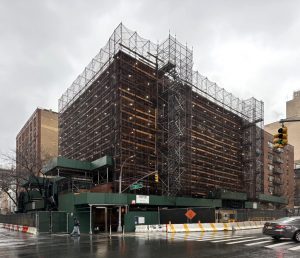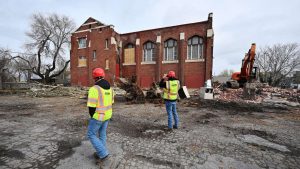Subpoenas issued in criminal probe of Detroit demolitions
Published by John on
Detroit — A federal watchdog agency has issued a new round of subpoenas in its ongoing criminal investigation into the city’s demolition program.
In subpoenas issued this month, the Special Inspector General for the Troubled Asset Relief Program is seeking two years’ worth of documentation from certain contractors over dirt used to fill holes for homes torn down under the blight removal effort.
The feds demand that demolition firms produce receipts and records that reveal where their backfill dirt was coming from, who trucked it to sites in Detroit and where it was dropped off.
The subpoenas are the latest development in the agency’s ongoing criminal probe of demolition in Detroit after the federally funded program came under scrutiny in 2015 amid concern over bidding practices and soaring costs.
A copy of a Jan. 10 subpoena obtained by The Detroit News seeks documentation for specific contracts from 2016 through 2018 and notes the information sought is “relevant or material to an ongoing investigation.”
Rebecca Camargo, an attorney for one of the contractors targeted, said subpoenas were issued this month to at least seven different demolition companies.
One of her clients, Jackson-based Smalley Construction, received one on Jan. 11 and turned over its documentation to SIGTARP on Monday.
“We’ve compiled all the information for Smalley that they’ve asked for and sent it to them,” said Camargo, a Troy-based attorney who formerly served eight months as the land bank’s director of demolition before stepping down in August 2017.
“As far as we know, they are reviewing it,” she said of SIGTARP. “We have not gotten a response from them yet.”
Camargo noted the subpoena asked for information pertaining to several different contracts. For most of the properties, Smalley has not yet completed those jobs. For properties it has knocked down, the company has supplied its backfill tickets. The company, she added, uses dirt from residential projects to fill its open holes.
Rob Sholars, a spokesman for SIGTARP, said Tuesday that it’s the office’s policy not to comment on any ongoing investigations, including confirming whether they exist.
The newly issued subpoenas were first reported Sunday by Deadline Detroit.
Reached Tuesday, Christian Hauser, an attorney for several demolition and abatement contractors involved in the program, said he was unable to confirm whether his clients received subpoenas.
The Detroit Land Bank Authority oversees the blight elimination effort along with the Detroit Building Authority. More than 16,000 blighted homes have been demolished under the program since May 2014.
The land bank has not received any subpoenas related to backfill used at demolition sites, said spokeswoman Alyssa Strickland, adding “but we do continue to cooperate fully with the SIGTARP investigation.”
Brian Farkas, director of special projects for the building authority, said the city and the building authority hadn’t received subpoenas either. The city, he said, is cooperating “with all inquiries and investigations into our demolition program.”
The Michigan State Housing Development Authority allocates funds for the program under the state’s Homeowner Assistance Non-Profit Housing Corp.
The state on Tuesday said it also has not received subpoenas related to backfill from SIGTARP.
Katie Bach, a spokesman for MSHDA, said in a Tuesday email to The News that Detroit implemented a new dirt tracking system late last year to better document dirt that’s being used for demolitions.
“The guidelines require source of dirt, the address it’s going to, and size of load by cubic yard or square feet,” she said.
During the time period referenced in the subpoena, Detroit required contractors to provide invoices for dirt and the land bank maintained load tickets that documented the quantity and where it was dropped, according to MSHDA.
“The biggest difference is that the source is now being documented,” Bach said. “MHA supported the guideline changes because they made sense for the continued success of the program.”
Strickland said the land bank prioritizes public health and safety and it always had rules that govern backfill for demolitions. It’s covered in requests for proposals, she said, “so all contractors know exactly what the requirements are each time they bid and sign a contract.”
The building authority then manages those contracts and requirements.
Under program policy, Farkas said demolition contractors are required to identify the source of all backfill materials and maintain records for inspection upon request.
“These requirements have been updated, and contractors are now required to sign an affidavit and provide documentation regarding dirt source and destination,” Farkas said.
Contractors must also perform sampling and analysis of materials that come from sources that may exceed state criteria for residential use.
Sampling has informed the building authority’s decision to prohibit the use of soils from certain projects, including the I-96 construction project and Little Caesars Arena.
The building authority, Farkas said, has strict penalties for contractors found to have violated the policy, including a 30-day bid disqualification for a first offense, 90 days for a second and nearly a full year for a third offense.
Several contractors were sanctioned for violating the policy between 2016 and 2018, he said. Each had to pay for the cost of removal, replacement and proper disposal of the unauthorized fill.
SIGTARP is a federal law enforcement agency established by the Emergency Economic Stabilization Act of 2008 to conduct, supervise and coordinate audits and investigations of the purchase, management and sale of assets under the Troubled Asset Relief Program.
In 2016, the agency issued subpoenas demanding the land bank and building authority hand over information on federally funded contracts and several demolition contractors.
Detroit’s auditor general, who is conducting an ongoing audit on the city’s demolition activities, and several contractors involved in the program previously confirmed that they’d received subpoenas from SIGTARP in 2016 as well.
The federally funded effort has also been the subject of state and local audits, reviews and a probe being conduct by the Detroit Office of the FBI.
In 2017, The News reported that a federal grand jury was focused on whether dollars earmarked for tearing down blighted homes in the city were misappropriated.
As many as 30 contractors and city agencies were believed to have been subpoenaed to testify or provide documents.
A past review of the program’s billing practices conducted by the state turned up $7.3 million in what the state argued were “inappropriate” or “inaccurate” costs — the vast majority in connection with a controversial set-price bid pilot in 2014 designed to quickly bring down big bundles of houses.
Detroit’s Office of Inspector General issued findings last month from an independent, three-year investigation into the set-price contracts that concluded meetings between city officials and specific contractors to discuss federally funded demolition work before public bidding didn’t violate written rules but gave the impression of “preferential treatment.”
cferretti@detroitnews.com




